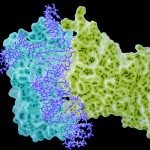Lien vers Pubmed [PMID] – 25173450
Curr. Opin. Struct. Biol. 2014 Oct;28:96-104
Integrative structural modeling uses multiple types of input information and proceeds in four stages: (i) gathering information, (ii) designing model representation and converting information into a scoring function, (iii) sampling good-scoring models, and (iv) analyzing models and information. In the first stage, uncertainty originates from data that are sparse, noisy, ambiguous, or derived from heterogeneous samples. In the second stage, uncertainty can originate from a representation that is too coarse for the available information or a scoring function that does not accurately capture the information. In the third stage, the major source of uncertainty is insufficient sampling. In the fourth stage, clustering, cross-validation, and other methods are used to estimate the precision and accuracy of the models and information.

